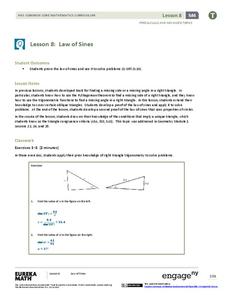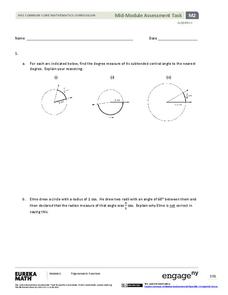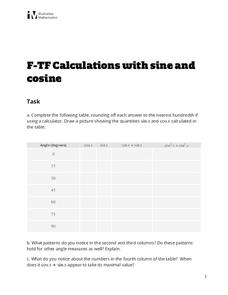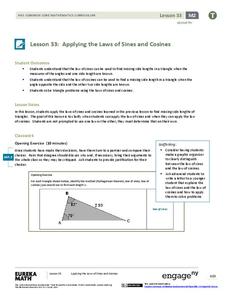EngageNY
Law of Cosines
Build upon the Pythagorean Theorem with the Law of Cosines. The 10th part of a 16-part series introduces the Law of Cosines. Class members use the the geometric representation of the Pythagorean Theorem to develop a proof of the Law of...
EngageNY
Tangent Lines and the Tangent Function
Construct tangent lines and make the connection to tangent functions. An informative lesson reviews the geometry origins of the tangent function. Pupils use that information to determine how to construct a tangent to a circle from a...
EngageNY
Addition and Subtraction Formulas 1
Show budding mathematicans how to find the sine of pi over 12. The third lesson in a series of 16 introduces the addition and subtraction formulas for trigonometric functions. Class members derive the formulas using the distance...
EngageNY
Properties of Trigonometric Functions
Given a value of one trigonometric function, it is easy to determine others. Learners use the periodicity of trigonometric functions to develop properties. After studying the graphs of sine, cosine, and tangent, the lesson connects...
EngageNY
Law of Sines
Prove the Law of Sines two ways. The ninth segment in a series of 16 introduces the Law of Sines to help the class find lengths of sides in oblique triangles. Pupils develop a proof of the Law of Sines by drawing an altitude and a second...
EngageNY
Mid-Module Assessment Task: Pre-Calculus Module 4
Challenge scholars to show what they know about properties and addition and subtraction formulas for trigonometric functions. The resource provides a mid-unit check on the progress toward mastery of trigonometric concepts. The areas...
EngageNY
Addition and Subtraction Formulas 2
Knowing the addition formulas allows for the calculations of double and half formulas. The fourth installment of 16 has the class use the addition formula to develop the double angle trigonometric formulas. Using the double formula,...
EngageNY
Special Triangles and the Unit Circle
Calculate exact trigonometric values using the angles of special right triangles. Beginning with a review of the unit circle and trigonometric functions, class members use their knowledge of special right triangles to find the value...
Balanced Assessment
Boring a Bead
How much material is in a bead? Class members utilize volume formulas to determine the amount of material in a bead. The goal of the assessment is to show that the amount of material left in a bead is the same for all beads with a...
Inside Mathematics
Hopewell Geometry
The Hopewell people of the central Ohio Valley used right triangles in the construction of earthworks. Pupils use the Pythagorean Theorem to determine missing dimensions of right triangles used by the Hopewell people. The assessment task...
West Contra Costa Unified School District
Introduction to Trigonometric Functions
Scholars first learn the definitions of the sine ratio, the cosine ratio, and the tangent ratio. After mastering these definitions, they use the new information to solve triangles.
Mathematics Vision Project
Module 5: Modeling with Geometry
Solids come in many shapes and sizes. Using geometry, scholars create two-dimensional cross-sections of various three-dimensional objects. They develop the lesson further by finding the volume of solids. The module then shifts...
EngageNY
What Is a Trigonometric Identity?
Protect yourself from identity theft! Establishing a strong understanding of the Pythagorean identity allows learners to prove that sine^2x + cos^2x = 1. They then use the identity to find sine or cosine ratios given the other.
EngageNY
Algebra II Module 2: Mid-Module Assessment
Time for classes to show what they've learned. Use several tasks to assess understanding of the trigonometric functions, unit circle, radians, and basic trigonometric identities.
EngageNY
Secant and the Co-Functions
Turn your class upside down as they explore the reciprocal functions. Scholars use the unit circle to develop the definition of the secant and cosecant functions. They analyze the domain, range, and end behavior of each function.
EngageNY
Why Call It Tangent?
Discover the relationship between tangent lines and the tangent function. Class members develop the idea of the tangent function using the unit circle. They create tables of values and explore the domain, range, and end behavior of...
EngageNY
Extending the Domain of Sine and Cosine to All Real Numbers
Round and round we go! Pupils use reference angles to evaluate common sine and cosine values of angles greater than 360 degrees. Once they have mastered the reference angle, learners repeat the process with negative angles.
EngageNY
From Circle-ometry to Trigonometry
Can you use triangles to create a circle? Learners develop the unit circle using right triangle trigonometry. They then use the unit circle to evaluate common sine and cosine values.
West Contra Costa Unified School District
Law of Sines
One must obey the sine laws. A instructional activity introduces and derives the Law of Sines for non-right triangles. With examples that use the Law of Sines to determine unknown measures in triangles, the instructional...
Willow Tree
The Pythagorean Theorem
There isn't a more popular geometry formula than the Pythagorean Theorem! Learners understand the special side relationships in a right triangle. They use the Pythagorean Theorem to find missing sides and to solve problems. They begin...
Illustrative Mathematics
Trigonometric Ratios and the Pythagorean Theorem
Take an alternative route with trigonometry and let learners connect a tweaked version of the pythagorean theorem to the original in terms of triangle sides. The assignment leads participants towards deriving the Pythagorean identity...
Illustrative Mathematics
Calculations with Sine and Cosine
Practice makes perfect and perfecting those trigonometric functions are vital in trigonometry. The task requires evaluating cosine and sine values at common degree measures before looking at the results. Is there a pattern when the...
Illustrative Mathematics
Finding Trig Values
Let's keep trigonometry simple. When given a cosine ratio, learners must use the clues about the quadrant to determine the sine and tangent ratios. The answer key has a complete worked-out solution to help guide pupils through the...
EngageNY
Applying the Laws of Sines and Cosines
Breaking the law in math doesn't get you jail time, but it does get you a wrong answer! After developing the Law of Sines and Cosines in lesson 33 of 36, the resource asks learners to apply the laws to different situations. Pupils must...

























